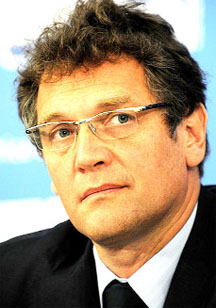ZURICH, (Reuters) – FIFA is planning to take greater control over international friendlies after a fake Togo team played in one game in September and seven penalties were awarded in two matches in Turkey last month.

Until now, FIFA have taken little interest in friendlies, allowing national associations to set up games where and when they want without intervention.
But on Thursday FIFA secretary-general Jerome Valcke said that, following the recent incidents which threatened the sport’s credibility, soccer’s governing body planned to tighten the rules.
“We have had problems with friendlies played in Turkey and also the match between Bahrain and Togo and we want to make sure these kind of matches cannot happen anymore without a clear indication to FIFA,” Valcke told reporters.
“We will strengthen our capabilities of intervening if we have the feeling there is a suspicion of match fixing, or whatever to protect football.”
“We would need a several types of information including the name of the referee. FIFA and the confederation will have the power to change the referee if we think he’s not the right referee to be in charge.
“In Turkey, there was a grey area.”
Seven penalties were awarded in two friendlies held one after the other in the Turkish resort of Antalya last month with Latvia beating Bolivia 2-1 and Estonia drawing 2-2 with Bulgaria.
All four federations complained to FIFA, who are investigating, and Bolivia cancelled friendlies this month against Finland and Bulgaria, also in Turkey.
Bahrein’s 3-0 win over Togo was quickly forgotten when it transpired that the African team was a fake.
Tchanile Bana, an assistant coach of the real team, was suspended for three years for taking the imposters to Bahrain.
Valcke said the new measures would first have to be approved by the FIFA Congress in May. FIFA president Sepp Blatter said he took the threat of match-fixing, usually by illegal betting rings, seriously.
“We have 60 professionals working in our legal service, it is one of the biggest departments,” he said.
“Football has become a very attractive game for gambling and we have to protect it.
“You have to protect the game. We are a victim of our popularity and we must also take responsibility.”





